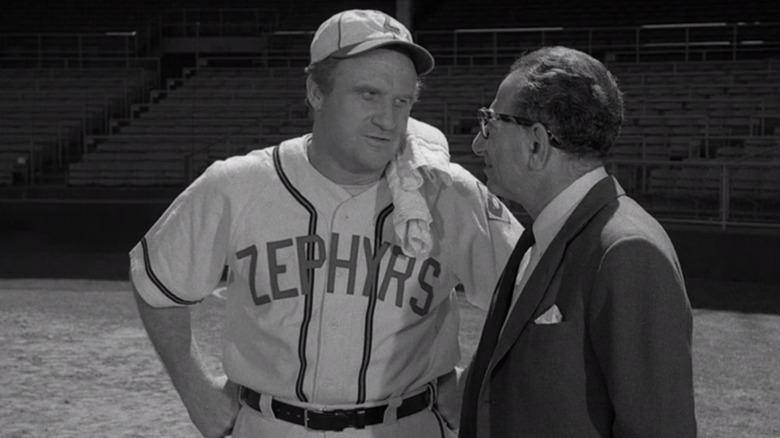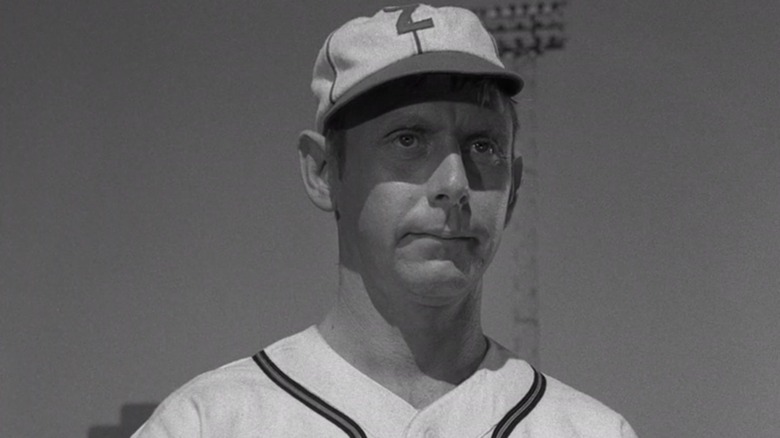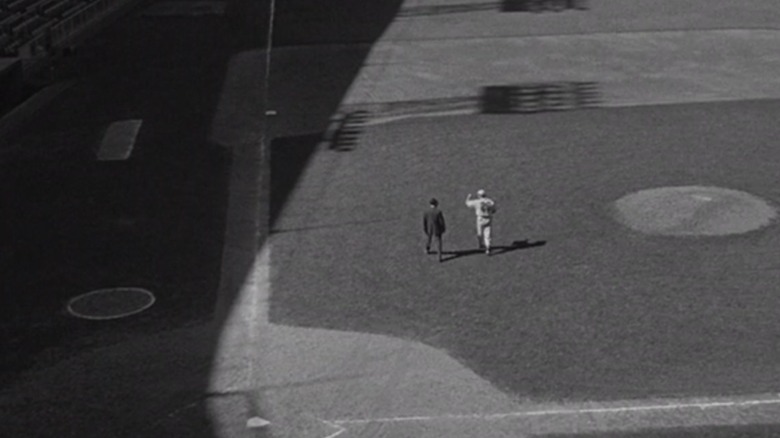A Real-Life Tragedy Forced The Twilight Zone To Reshoot An Entire Episode
Most fans of "The Twilight Zone" know that there's typically nothing funny about the show's attempts to do comedy. As a storyteller, Rod Serling was part poet, part prophet, part pioneer, and though he had the ability to create a seemingly endless supply of profound moral tales and prescient horror stories, he wasn't exactly a humorist. Many of the seminal sci-fi series' comedic episodes go down like a lead balloon, and the season 1 outing "The Mighty Casey" is no exception.
The episode follows a failing underdog baseball team called the Hoboken Zephyrs, which gets a surprising new advantage in the form of a pitcher named Casey (Robert Sorrells), who happens to be a robot. With Casey on the mound, the Zephyrs are undefeatable, but in typical "Twilight Zone" fashion, anything that sounds too good to be true is. The wheel of fortune turns when Casey is given a heart that makes him start to feel. He becomes too empathetic to endure the ruthless competition of sports and quits the game altogether. At episode's end, Serling implies that the team's coach, McGarry (Jack Warden), ended up making a whole team of robots — all of them heartless — in order to win games.
"The Mighty Casey" isn't just unfunny because the humor doesn't come across that well; it's an episode that also has a painfully serious backstory. According to Marc Scott Zicree's book "The Twilight Zone Companion," a completely different version of the episode was shot before the one audiences were shown, but it was ultimately scrapped when the actor set to play McGarry died just days after shooting. In retrospect, Serling realized the actor had been gravely ill during filming, and he respectfully chose not to let "The Mighty Casey" air without recasting the part.
One star's final role went wrong
The original McGarry was due to be Paul Douglas, a stage turned screen actor who starred in films like "Panic in the Streets" and "A Letter to Three Wives" before his death at age 52. According to Serling, it was clear during filming that something was wrong with Douglas, but the series creator mistakenly assumed he was intoxicated. "I loved Paul Douglas," Serling is quoted as saying in Zicree's book. "There was something gutsy and ballsy about this guy and you could always count on him." But when he was hired for the part, Serling said he had established "a reputation for being heavy on the bottle," so Douglas' casting came with assurances from his agent that the actor would not drink while working on the show.
According to Serling, it was clear that Douglas wasn't well based on the footage from day one. He looked "even in black and white, mottled. . . high color, semi-diffuse, a breath so short that he couldn't continue one short staccato sentence without [gasping for breath]." Furious, Serling called Douglas' agent to discuss the actor's drinking, but was once again told that, to his agent's knowledge, that wasn't the case. It was only after the shoot finished (Serling called it "disastrous") on a Thursday and Douglas died by Saturday that the filmmaker realized how off-base he had been. His description of the tragedy sounds like something out of the show itself: "What he had been suffering, of course, was an incipient coronary and we were watching him literally die in front of us."
Serling re-shot the episode after Douglas' death
Serling showed the episode footage to CBS, but also told execs it needed to be reshot given the tonal dissonance between the comedic plot and the final product. The studio said a reshoot would be too expensive, but Serling wasn't having it. According to Zicree, he paid $27,000 out of his own pocket to reshoot Douglas' parts of the episode, making as few edits to the original as possible. Director Robert Parrish, who later won an Oscar for his editing work on "Body and Soul," stepped in to finish filming what "Lost in Space" filmmaker Alvin Ganzer had started eight months earlier. To say that the end result was good would be an overstatement, but it was mercifully unmemorable compared to the scrapped version that, as Serling said, would've featured an actively dying man. Instead, Paul Douglas was able to bow out with some admirable final roles that were shot during better days, including a turn on "Alfred Hitchcock Presents."
Serling's opening lines for the episode, meant to be about a baseball stadium, are sadly reminiscent of the macabre production tragedy: "What you're looking at is a ghost, once alive but now deceased." Thanks to his personal decision, though, we don't actually see the ghost after all. According to Comic Book Resources, Douglas only appears in one shot of the final version of "The Mighty Casey," walking away in a long shot as the story draws to a close.


